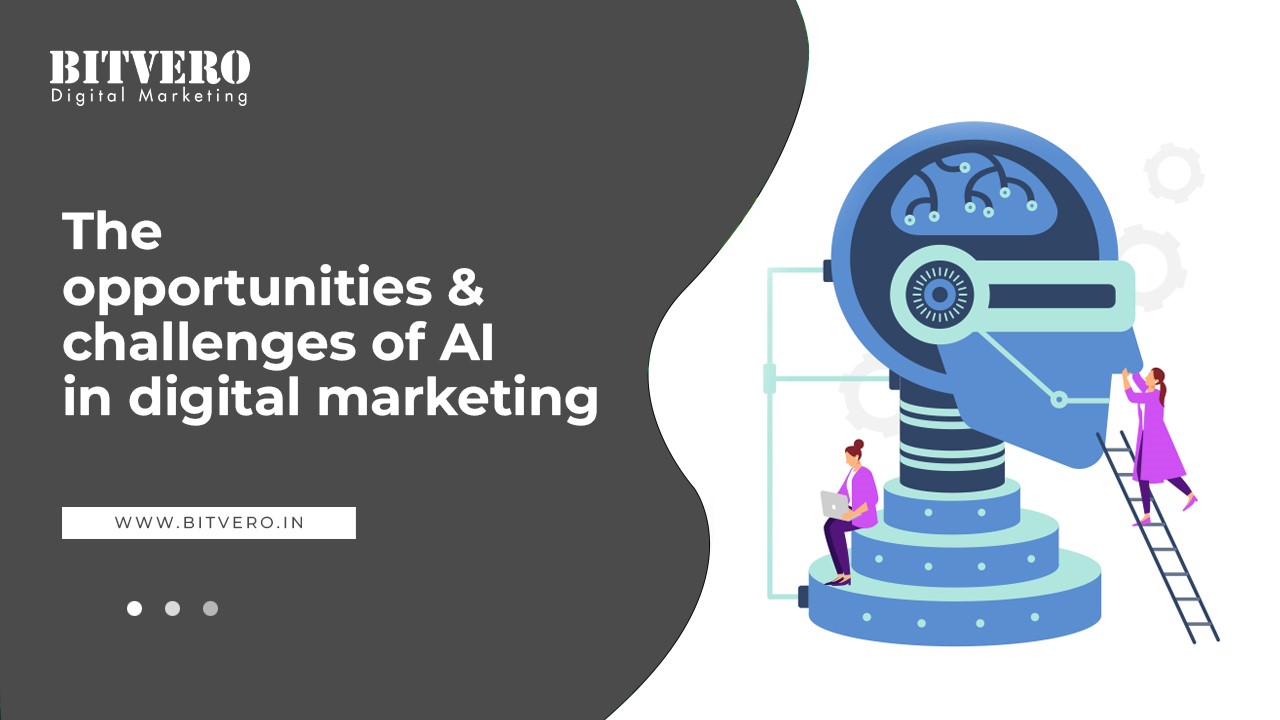The opportunities & challenges of AI in digital marketing
- September 21, 2023
- Artificial Intelligence

AI is the new normal!
People are embracing AI technologies at a very fast pace.
From virtual assistants like Alexa & Siri to conversational chatbots like ChatGPT or Google Bard, AI is emerging as a new part of the modern world.
From journalism & finance to healthcare, almost in every field, AI is taking over the world.
With its capabilities of performing various tasks quickly and more efficiently, it is all set to substitute human efforts and reduce the time and energy required to conduct a specific job.
In digital marketing, too, AI has brought several opportunities.
Natural language processing models and automation tasking tools have transformed the marketing landscape.
However, with all the opportunities that AI gives to digital marketing, some challenges are also there.
In this article, we will take a look at both opportunities & challenges of AI in digital marketing.
The Opportunities of AI in Digital Marketing
When there are various benefits of AI in digital marketing, some notable ones include:

Personalised Targeting
Personalisation in marketing helps in creating a relevant customer experience, resulting in higher engagement, conversions and, ultimately, a loyal customer base.
By identifying the interests and behaviours of customers, it becomes easy to tailor marketing strategies accordingly.
To identify customers’ interests regarding a product, their age, gender, location, etc., AI plays an important role.
AI algorithms analyse large amounts of customer data from various sources like website visits, social media interaction, and purchase history to help digital marketers differentiate among them and target accordingly.
For example, tools like Google Analytics provides customer’ with valuable information and insights like-
- Popular pages among visitors
- Page visit frequency
- New vs. returning visitors
- Time spent per visitor
- Retention and bounce rates
- High-impact keywords attracting visitors
that help in making digital marketing campaigns more effective.
Automation Facilitation
Another opportunity that AI brought is providing an automation facility. Several areas in marketing require repetitive tasks that consume both time and energy if done manually.
Email marketing and social media postings are a few examples that are being done on a regular basis.
For this, AI automation tools like Hubspot, Hootsuite, Mailchimp, etc., help automate routine tasks.
From managing bulk email shots to scheduling social media posts, AI-driven automation allows marketers to focus on more strategic activities and utilise time effectively.
Competitive Analysis
Analysing competition is at the core of digital marketing.
From conducting search engine optimisation to social media marketing, the task of identifying competitors’ marketing strategies and making efforts to get ahead of them always remains there.
AI-powered tools have made competition analysis quite easier.
Whether it is about finding high-performance keywords, investigating backlinks or monitoring competitors’ overall social media strategy, AI-powered tools have revolutionised how businesses approach competitive analysis.
One best example includes keyword research tools like Ahref, SEMrush, and Google Keywords Planner, which help in finding the right keyword quickly and easily, making organic SEO more effective.
Content Generation
AI has revolutionised the realm of content marketing. In just seconds, a whole piece of content can be created without investing much effort or time.
AI generative models are capable of producing any type of content, including texts, infographics, images or even video, at just fingertips.
Text-based AI models like ChatGPT or Google Bard have become sensations.
Almost in every field, people are using them on a large scale.
In digital marketing, they have streamlined the process of content creation.
From crafting effective marketing copies for Google ads & social media campaigns to writing lengthy articles for websites or blog posts, the tools have the capacity to use different tone styles & brand voices.
The Challenges of AI in Digital Marketing

Privacy Concerns
AI-driven digital marketing heavily relies on collecting and analysing users’ data.
Storing web cookies to track users’ behaviours and recording the information of existing customers are both part of it.
Concern about data privacy and the ethical use of personal information has emerged in modern times.
Using someone’s personal information without permission has become a serious privacy violation and can lead to legal action.
Thus, with the prevailing data protection laws, including the European Union’s GDPR and India’s recent Personal Data Protection Law, collecting users’ personal information without their consent becomes challenging.
The laws require marketers to obtain explicit consent from individuals before processing their information. Also, it provides users with rights, including the right to know, access, and delete their information.
Copyright issues
Another challenge of AI in digital marketing is the infringement of copyrights.
For content marketing, marketers use AI generative tools to create content.
As the models have been trained on various datasets deriving from various existing sources like text and images, they sometimes end up producing content that belongs to the copyright owner.
In several instances, AI tools like ChatGPT and GPT4 have been found to infringe on copyrights, leading to legal actions.
One such instance includes when Getty Images sued Stability AI, alleging that it copied more than 12 million images from the Getty Images database without permission or compensation.
Lack of Human Touch
AI in digital marketing surely helps provide a personalised experience by analysing the information and behaviour of users.
But still, it cannot match the level of personalised experience a human can provide to the customers.
For example, AI chatbots can only handle customer queries at a certain level but fail to satisfy customers with complex questions or issues. In such cases, human intervention is necessary to understand what the customer is exactly seeking and address them accordingly. If customers do not get the expected understanding or empathy, they become frustrated and leave immediately.
Inaccurate information & poor-quality data
AI in both content generation and task automation relies on the information or data fed into them.
If you use AI tools to create marketing content, there are chances that sometimes information produced by AI tools may have some inaccuracies. The reasons are several, including limited cutoff knowledge, misunderstanding the dataset, misinterpreting the query’s intent or having a cut-off limit on the knowledge for up to a certain period.
Similarly, when using AI-powered tools for email marketing, it becomes important to ensure that the training data and inputs are accurate and relevant. Otherwise, the inaccuracies may result in misguided targeting taking all your email marketing campaigns in vain.
The Way Forward
The challenges & opportunities of AI in digital marketing are like two sides of a coin that go together. Thus, sticking to an all-or-nothing stance- means fully depending on or completely avoiding AI is not a wise approach. Rather, embracing a balanced strategy involving the effective utilisation of AI with vigilant human intervention is the way forward.
A team of digital marketing professionals who know the Art of making customers fall in LOVE with your brand!
